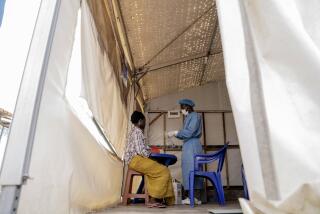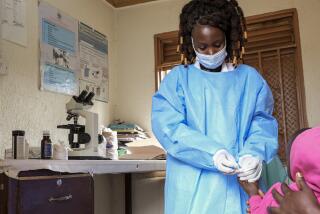Avoiding a Biological ‘Meltdown’ : Global cooperation is essential in the fight against contagious viruses such as Ebola
- Share via
Despite assurances of international health officials that the Ebola outbreak remains remote from population outside of Zaire, the spread of this killer from the town of Kikwit to several nearby villages renews questions about the world’s capacity to stop catastrophic epidemics.
Indeed, with the possibility that human or animal hosts might carry deadly viruses across not only borders but oceans, any local outbreak poses a far-reaching question: How can global breakouts be thwarted?
Stopping an invisible agent is a tall order, especially in a nation such as Zaire that is short of the resources, medical and otherwise, that are needed to deal efficiently with infections. Even as the world’s top epidemiologists work to contain the Ebola fever, there have been reports of a breakdown in the quarantine around Kikwit, where the virus was first reported.
Like AIDS, Ebola has no cure. It is believed to be spread through contact with blood and other bodily fluids. Should it move across 370 miles to the capital, Kinsasha, as some health officials fear, inhabitants could face the unthinkable: explosive transmission, a biological meltdown in which thousands could die in the city of more than 5 million.
That prospect is all the more terrifying given the nature of Ebola. Death comes quickly--usually within three weeks--and it is excruciating; Ebola turns healthy organs into what amounts to a viral soup. Authorities say the disease kills 90% of those infected. More than 400 died in isolated African villages in the 1970s when it first was recognized.
In the United States, the Public Health Service Act gives authorities broad powers to institute quarantines. According to the federal Centers for Disease Control, stations in major ports of entry, including Los Angeles, may isolate and contain individuals who arrive with obvious signs of infection.
That’s good, but with emerging and re-emerging diseases it’s not enough. Nations need better help in attacking viruses where they spring up. That takes funding, plus it takes vigilance by both the international medical community and local authorities.
Later this year the World Health Organization will convene a conference to discuss, among other things, tightening quarantine standards. There is clearly role for the United States in the matter of international epidemics. Humanitarian assistance, yes, and ultimately self-defense.
More to Read
Sign up for Essential California
The most important California stories and recommendations in your inbox every morning.
You may occasionally receive promotional content from the Los Angeles Times.













